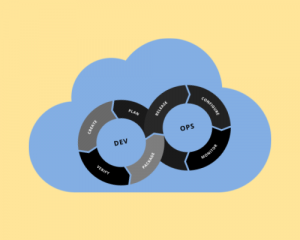Digital transformation has become a key factor for companies that are looking to increase their competitiveness in today’s world. To achieve this transformation and competitiveness, companies strive to have a balance between DevOps and Cloud computing. But what do these two terms mean?
DevOps refers to a software development methodology where software development is combined with information technology operations. DevOps helps in shortening the development life cycle, along with providing frequent fixes, features, and updates that line up with business objectives.
On the other hand, cloud computing is the practice of using remote servers hosted on the internet that are networked together to store, maintain, and process data instead of doing it on a local server.
Merging DevOps And Cloud
DevOps and Cloud computing work together as a team to overcome certain challenges. Let us see how:

- Cloud offers a centralized platform to DevOps to perform production, testing and deployment activities with automation. Cloud also fixes issues linked with the complicated nature of some enterprise systems that are unable to align with consolidated software deployment.
- Merging DevOps and Cloud provides centralized management and helps in maintaining a streamlined DevOps process. This reduces costs that are attached with on-premises DevOps. The centralized governance by the Cloud monitors developers and reduces trouble for them when they are designing and developing DevOps solutions.
- Cloud-centric DevOps powers accounting that keeps a tab on the usage of resources by users, developers, application, etc. Due to this, the task of tracking the cost of development and resources becomes easy and makes adjustments whenever required.
- New-gen applications require more complex technology stacks that involves great effort for the purpose of creation and configuration. Because of the Cloud, these development functions take nothing more than a few hours unlike old times when these functions used to take weeks and months.
- In addition to higher business agility, Cloud computing ensures flexibility in IT infrastructure via streamlined DevOps processes. DevOps services and tools minimize human errors and help in forming repeatability through process streamlining, creating automation in building code, and managing the same.

What To Consider When Working With Cloud And DevOps
DevOps is, without any doubt, a cultural transformation. This transformation is achieved faster with the help of Cloud and organizational support. Companies need to keep several factors in mind when going for Cloud adoption, such as, picking the right tools and technologies to work with (DevOps offer a lot!), selecting a Cloud provider who offers the best price, etc.
Apart from this, security is something which requires attention. With many companies being trapped are falling victim to hackers and their unethical deeds, implementing security becomes the topmost concern. IT professionals incorporate security to DevOps and Cloud as these two platforms are the most crucial that help in driving business development. DevOps professionals inculcate DevSecOps (security as code) into their framework in order to avoid security breaches.

Knowing DevOps And Cloud Further
It is not Cloud vs DevOps, but rather a collaboration between these two that drives the success of most businesses. Cloud computing and DevOps are a powerhouse together. Both of them offer great effectiveness and have a huge business impact. If gelled up well, they can drive meaningful digital transformation that can affect business goals directly.
References: heliossolutions, devops, agilestacks, tripwire, dzone












